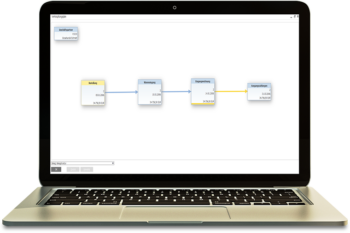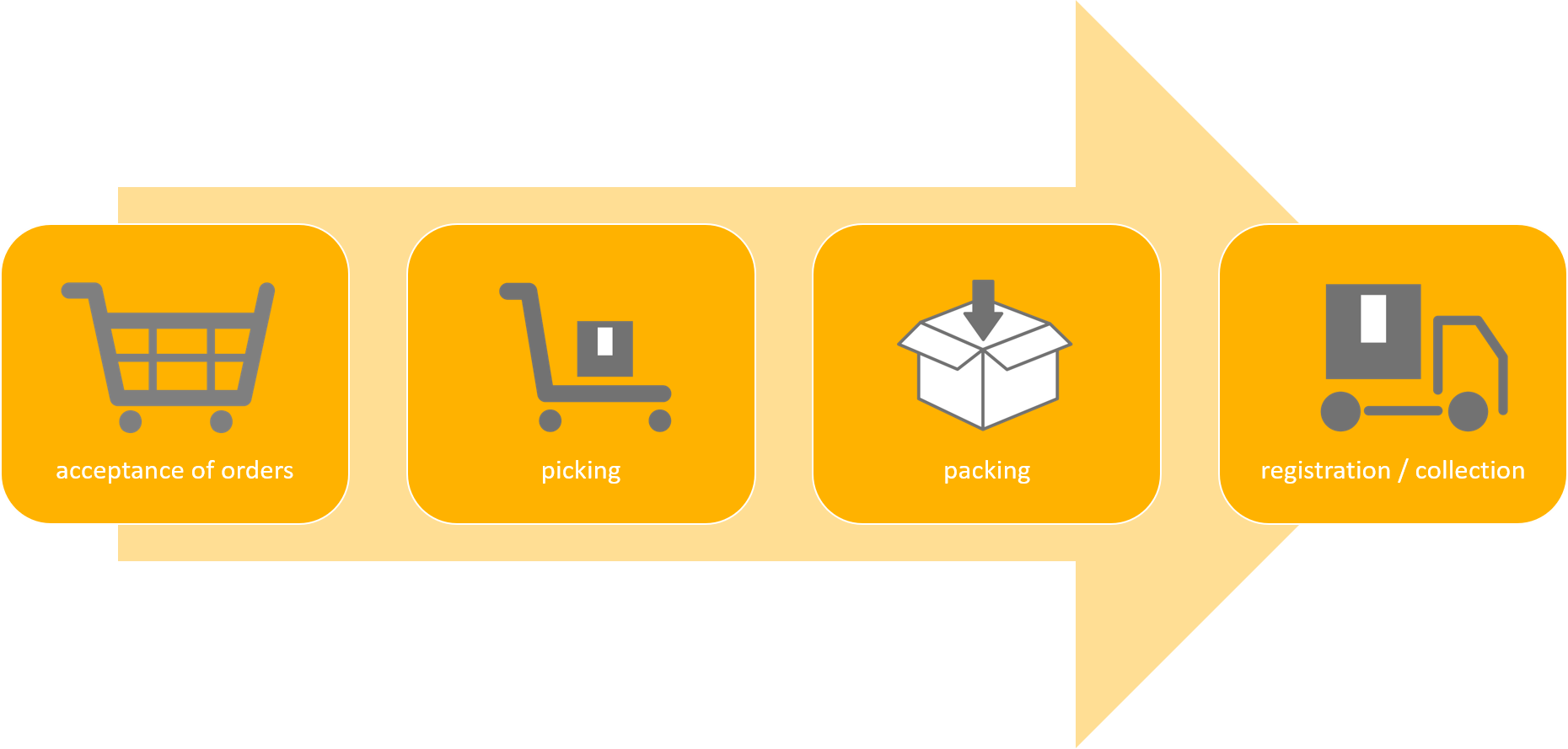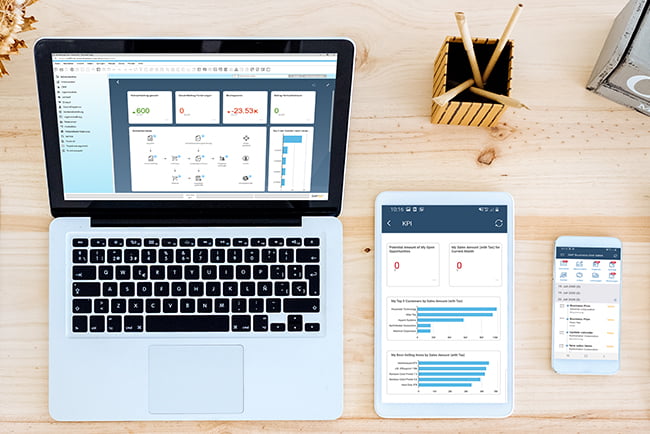
Wholesale/Retail companies
Master the challenges in retail with SAP Business One
Retail companies sell a wide range of consumer goods – for example electronics, cosmetics, food, furniture, clothing etc. In doing so, it is often not possible to clearly separate between wholesale and retail trade because they mostly supply retailers (B2B) but also sell directly to end customers (B2C) by using e-commerce solutions. The development of own brands is of great importance.
Different sales channels generate numerous documents which can no longer be mastered with Word and Excel. One of the main challenges for retailers is monitoring, planning and communicating the inventory. Not managing this challenge often reflects in sales losses in the long term.
A uniform ERP solution means transparency in every company by centralizing all company data. By networking through the cloud, all employees have a uniform level of information. In addition, the seamless connection to other cloud applications (web stores, marketplaces, etc.) creates advantages over the competition.
Structured business processes
SAP Business One has built-in processes that can be used immediately and thus ensure the right structure for business. The ERP system contains all essential company data, manageable via dashboards which can be created by each user with the help of a prefabricated library of key figures. SAP Business One enables detailed reporting based on real-time data, either individually or by using time-saving and standardized templates.

Analytics and reporting
The more customers and orders, the greater the risk of losing the overview. SAP Business One brings all the important information from sales, customer management, operational business and financial management together and makes it company-wide available. Instead of using multiple Excel-tables, the data is stored centrally in the fully integrated system. The essence: reliable data, falling error rates and consequently falling costs.
Sales
Sales need information about customers and items in order to prepare customer appointments properly. The SAP Business One Sales App for tablets and smartphones enables access to this information from anywhere and in real time. During an appointment with the customer, offers and orders can be created immediately and passed on seamlessly from the field service to the office staff. The inventory, deliveries and invoices can be viewed at anytime and from anywhere, so that questions about e.g. delivery dates can be answered immediately when visiting a customers. Sales can be handled using individually adaptable dashboards in the app.
Online marketplaces
Nowadays, online marketplaces have achieved enormous importance in retail. Addressing the end customer (B2C) e.g. by using e-commerce solutions enables close customer loyalty and knowledge about the end customer is often incorporated into the product development. Nevertheless, experience has shown that many companies do not use any online marketplace at all or only one online marketplace – although it is no big deal to open up additional marketplaces with the existing article master data. SAP Business One makes it easy to set up a homogeneous stock list: the stock list is easy to maintain, articles can be easily duplicated, there is the possibility of creating template articles and there is the possibility to create separate price lists for online marketplaces.
With the Integration Hub of SAP Business One, a connection to online marketplaces such as Shopify, Magento and WooCommerce is already included in the standard. The dunning process goes hand in hand with the online marketplaces. For this purpose, SAP Business One has a built-in dunning assistant that supports up to three dunning levels.

Purchasing
Procurement processes, pricing and supplier inquiries require clearly defined processes which are supported by SAP Business One in every step. Real-time information as a basis enables a noticeably simpler and more efficient procurement process which can be easily evaluated and processed through the central bundling of orders. The ERP system offers optimal transparency of individual agreements by recording the agreed conditions and making them available for comparison analyzes at any time. For complex manufacturing and procurement processes, SAP Business One offers the option of planning the required quantities and making recommendations using an assistant.
Managing goods and stocks
Companies in the retail sector often use drop-shipments, a fulfillment service provider or a distribution center in order to avoid an investment in an own warehouse. However, drop-shipments and fulfillment service providers do not solve all inventory management problems. SAP Business One, as a common data hub, makes it possible to record, monitor and transport goods to connected systems (goods management). This means that, on the one hand, the stocks from the drop shipments can be managed and e.g. transferred to a web shop and, on the other hand, the returns can be managed. This enables need-based planning and thus helps to avoid e.g. incorrect deliveries.
Warehouse management in companies with their own warehouse takes on an even greater role. Terms such as seasonal goods, minimum stock, maximum stock, actual quantities and target quantities are of central importance. SAP Business One is able to take the best before date (BBD) into account which is especially in the food trade an important aspect. In doing so, the warehouse can be organized according to the BBD. The ERP system supports batch numbers and serial numbers in order to be able to fully trace articles in the flow of goods (traceability).


Fulfillment process
The term “fulfillment” refers to the entire process of order processing. Fulfillment tasks include for example:
- acceptance of orders (e.g. from the webshop)
- picking (e.g. with an app or a scanner)
- packaging of goods and products (with quality assurance e.g. weighing and creating a photo)
- registration / collection at the logistics company
The SAP Business One App for warehouse management on mobile devices enables mobile warehouse and goods management. It supports all goods movements in the warehouse in real time from incoming goods through pick & pack to delivery.
Own stores and branches
In the long term, companies operating in the retail sector can apart from the e-commerce possibilities also set up their own stores in order to create a local shopping experience for customers. SAP Business One depicts stores as branches and a profitability calculation of the stores is already provided in the standard. Apps can be used to record the times of employees on site.
In addition, SAP Business One offers an integration of the checkout solution “customer checkout” which fulfills and supports all common requirements at the point of sale: sales, payment processing, discounts, item management and customer management. Each store has its own warehouse which can be managed from the head office and in which material requirements planning is taken into account. This ensures that enough goods are available in the stores.

Extensions and interfaces
start small: when implementing SAP Business One, we initially focus on the essentials so that the ERP system is ready to use as quickly as possible. Templates prefabricated by us allow an implementation within a few days.
THINK BIG: for the medium and long-term planning, we work out an individual strategic roadmap with our customers that includes when and which extensions are planned. Possible extensions are: the connection of web shops, the optimization of warehousing with apps, the connection of logistics service providers, the use of the SAP checkout solution (customer checkout), the connection of CRM systems such as Salesforce or MS Dynamics and the use of marketing automation such as Mailchimp and SendGrid. The extensions can be implemented independently by the customer using API.
Start-up LCGK uses SAP Business One in the cloud for rapid customer growth
SAP Business One supports rapid growth
The fast-growing food retailer LCGK has introduced the ERP system “SAP Business One” as a cloud-based solution. CEO Mert Philip Karpuz was able to create his own demo system on www.business-one.cloud within 3 minutes. He was also convinced by the transparent quotation of the SAP partner conesprit. One of the best decisions he made, says Karpuz looking back.
Create a SAP Business One test system in 3 minutes

Do you want to get your own picture
of SAP Business One?
SAP Business One Cloud Demo system
30 days free trial without obligation



